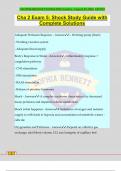©SOPHIABENNETT@2024-2025 Sunday, August 25, 2024 2:42 PM
Cha 2 Exam 5: Shock Study Guide with
Complete Solutions
Adequate Perfusion Requires: - Answer✔️✔️-- Working pump (heart)
- Working vascular system
- Adequate blood supply
Body's Response to Stress - Answer✔️✔️-- Inflammatory response +
coagulation pathway
- CNS stimulation
- SNS stimulation
- RAAS stimulation
- Release of pituitary hormones
Shock - Answer✔️✔️-A complex syndrome characterized by decreased
tissue perfusion and impaired cellular metabolism
Shock (what happens) - Answer✔️✔️-Imbalance of oxygen and nutrient
supply to cells leads to hypoxia and accumulation of metabolic wastes -
cells die
Oxygenation and Perfusion - Answer✔️✔️-Depend on: effective gas
exchange, total blood volume, CO, size/integrity of capillary bed
1
, ©SOPHIABENNETT@2024-2025 Sunday, August 25, 2024 2:42 PM
Shock (some causes) - Answer✔️✔️-Infection, CVD, Neuro injury, burns,
trauma, anephylaxis, surgery, inflammation, hemorrhage
Risk for Shock - Answer✔️✔️-Age (young/old), malnourished, smoking,
alcohol/drug abuse, altered fluid volume status, some medications,
chronic illness (DM II, COPD, GI ulcers, cancer, etc.), surgery, invasive
procedures, altered skin integrity, allergy, immunosuppressants, risk for
trauma or hemorrhage
4 phases of Shock - Answer✔️✔️-1: Initial
2: Non-progressive (compensatory)
3: Progressive
4: Refractory
Stage 1: Initial stage - Answer✔️✔️-signs may not be apparent, lack of
oxygen leads to anaerobic metabolism, increase in lactic acid levels,
adequate compensation
Stage 2: Non-Progressive (Compensatory) Stage - Answer✔️✔️-
Compensation from SNS, RAAS, ADH secretion
S/S: restlessness, skin may be flush (fever) or cool & clammy, tachycardia,
RR up, bowel sounds reduced, BP unchanged MAP mild decrease
Stage 3: Progressive Stage - Answer✔️✔️-Compensation begins to fail,
massive SNS release,
*decreased perfusion
2




